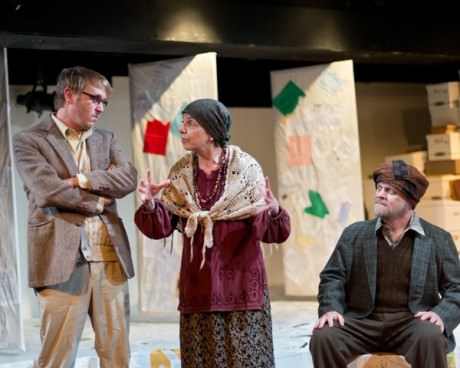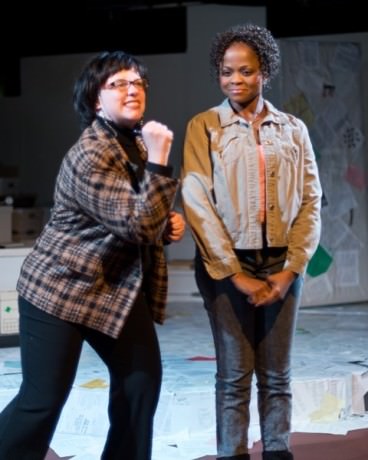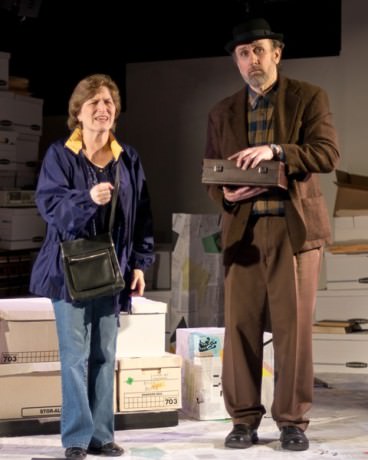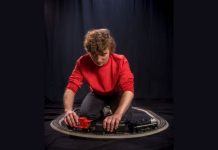The Language Archive at the Silver Spring Stage, is not a play about the language of love but of language and love, or more specifically, communication and emotion. The play centers on the marriage, now faltering, of George (Jonas David Grey) and Mary (Karen Fleming). George is a linguist. He archives languages both living and dead amidst hundred of cardboard boxes. He is immersed in his work while his wife of several years has come to realize that she cannot let her husband know, both through visible signs and written language, that she has become frustrated and miserable in her present life. She has decided to leave him.

In a parallel plot, Alta (Lennie Magida) and Resten (Kevin Dykstra), an elderly couple from somewhere Eastern Europe (based on accent and dress), are the last members of their ethnic group to speak their native tongue. George wants to record them for posterity. The elderly couple, who speak English as a second language, have no trouble communicating. When they argue, which they obviously have done their whole relationship as do most couples, they do so in English. English is the language, they explain, of anger. When they talk about their love and caring for each other, they communicate in their native tongue.
The play is more an epic piece of poetry filled with metaphors of life and death, love and feelings, real love and superficial infatuation and commitment to another being and commitment to work.
The play is ably directed by Joseph Coracle. He has the actors use many cardboard boxes not only as set pieces but as props. We are always wondering what is inside all of these boxes. Sometimes, we find out. Other times, the boxes are used to store articles, some which reappear later. The actors have been so well rehearsed that they always open or move the correct box without effort. He has his actors keep the pace up through movement and body posture. For a play about words there is just the right amount of physicality.
Jonas David Grey has captured this dull man without making him boring. George’s lack of outward emotion (George tells us he cares more about dying languages than dying people including his grandmother.) makes him a challenging role. However, Grey is able to draw us in through movement. George’s pacing and ungraceful movements let us know this is a man unable to express himself either verbally or physically.
Karen Fleming keeps his wife Mary from being just another unhappy housewife. We see her transform from a woman who can no longer communicate with her husband on any level, to one who finds fulfillment in a career as a baker.
My favorite characters in the show are the old peasant couple, Alta and Resten. They are humorous, compassionate and full of outward emotions. Lennie Magida and Kevin Dykstra are super in these roles. Magida’s Alta even walks like an old peasant woman. Dystra’s Resten is hysterically funny in the scene where he warns George off of his Alta’s cooking. The characters understand love, and the two actors understand and love the characters. They let the audience fall in love with them as well.

Emma, played by Juliana Ejedeoghaobi, is George’s assistant. She is smitten with George and eventually realizes that she loves him, probably more than Emma. However, this will always be an unrequited love. Ejedeoghaobi captures Emma’s essence. She fights to learn Esperanto (a language developed years ago to become the universal language) to please her boss.It is only when she realizes that she truly loves this man, that she can learn the now defunct language and can communicate with George, if only briefly. The actress allows us to look into the character’s heart.
In supporting roles Andrea Spitz does an amazing transformation to The Instructor. She plays a character probably much older and experienced than Ms. Spitz. When the actress came out after the show, wigless and in braids, I had to look twice to realize she had just been on stage. The Instructor is German but has learned to understand the importance of love through Esperanto which she is trying very hard to teach Emma.
Michael Sigler portrays both The Baker and Zamenhof. The former befriends Mary at a train station, and the latter is the creator of Esperanto. The language guru comes to Emma during a dream sequence. Sigler depicts with great insight the calm but desperate Baker and the somewhat arrogant eye doctor/language creator who cannot see into Emma’s heart.
The set designed by Bill Brown is an interesting conglomeration of boxes and papers stuck everywhere. I especially appreciated the use of the boxes to create couches, train stations and even a hospital room, which is very imaginative and allows action to flow uninterrupted throughout the performance. It is nicely complimented by the Lighting Design of Peter Caress, and by the costumes for Alta and Reston and the others which are smartly done by Helene Leahy.

Dialect Coach Gary Sullivan assisted the actors in keeping up their accents throughout, including the imaginary ones. And kudos to the original music written by Patrick Hughes which helps set the mood of the play. I know a production like this requires many capable hands we never see, so a round of applause goes to the rest of the crew.
Although the playwright has us bond immediately to Alta and Reston and eventually to Emma, Cho never allowed me to feel care, negatively or positively for the main character until the very end.
Don’t miss The Language Archive. The excellent performances, direction, and design create an innovative edgy production that we have come to expect at Silver Spring Stage. And this is one program you may want to save in your Playbill collection.
Running Time: One hour and 50 minutes, with one intermission.
The Language Archive plays weekends through May 2, 2015 at Silver Spring Stage-10145 Colesville Road, in Silver Spring, MD, located in the Woodmoor Shopping Center. Purchase your tickets online, or at the box office beginning an hour before the performance.
Performances are on Fridays and Saturdays at 8 p.m., plus Sunday matinees at 2 p.m. on April 19th and 26th. Regular ticket price is $20, but $10 tickets are available for select performances on Goldstar.
LINK:
“It’s Only Words…But Words are All We Have”: The ‘Language Archive’ Opens Tonight at Silver Spring Stage by Lennie Magida.





